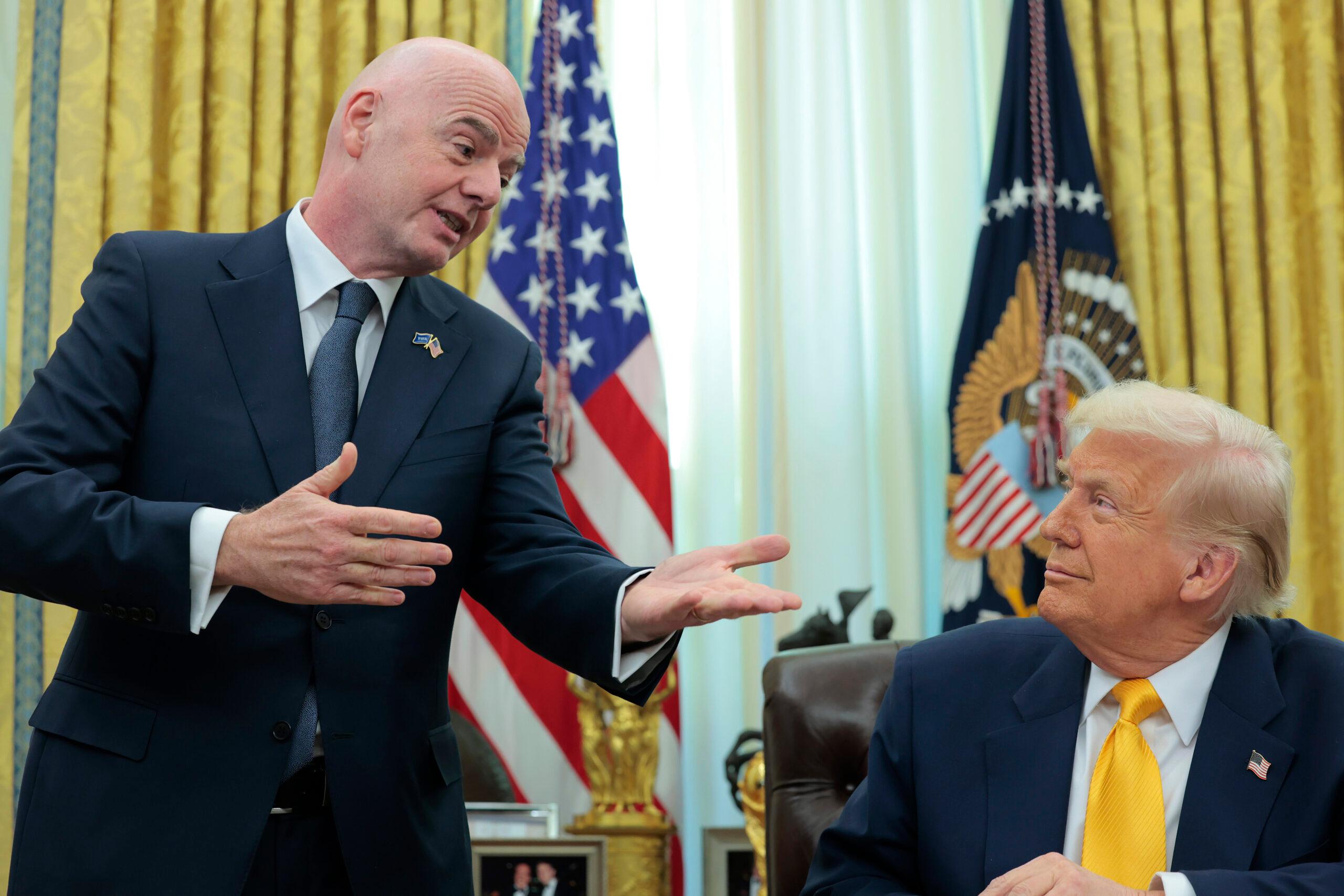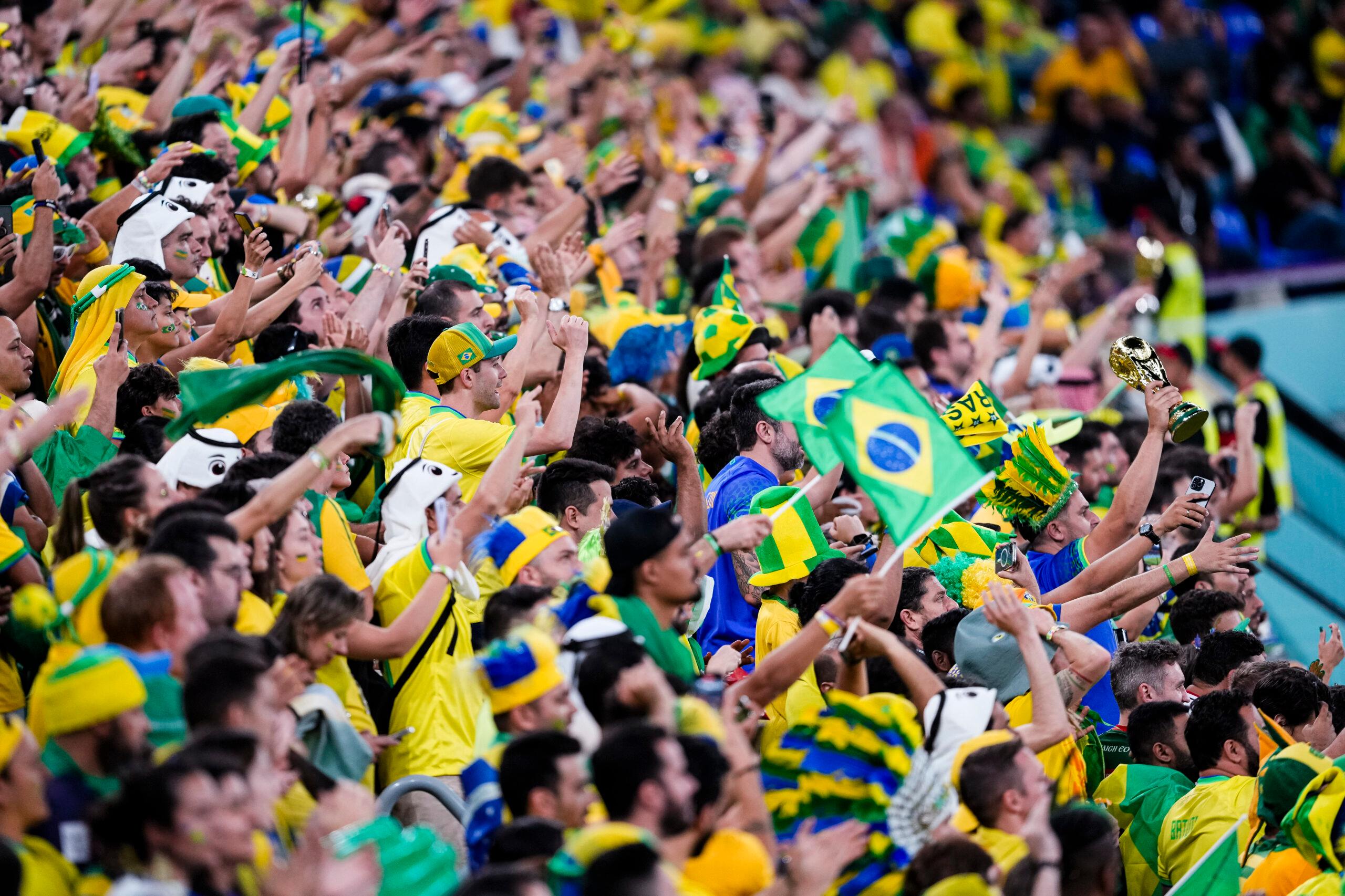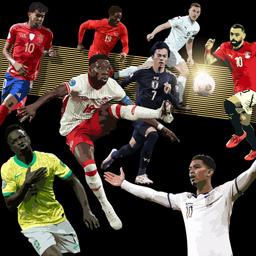1. O Sole Mio!
There’s a photo of Gianni Infantino and Donald Trump that, so gloriously stupid are its attributes, might be held to explain everything about sports and authoritarian politics in 2025 if future historians can plumb all its layers of meaning. Infantino is the president of FIFA, world soccer’s governing body. He’s the sort of large-skulled, brashly bald man whose entire head looks like siege equipment; with his broad, facile smile, he resembles a jack-o’-lantern wearing a skin-care face mask it bought on Instagram. In the photo, which dates back to March 2025, the two men are in the Oval Office, where Trump is signing an executive order to establish the White House Task Force on the FIFA World Cup 2026. The U.S. is cohosting this edition of the tournament with Canada and Mexico, though from the way Trump and Infantino talk about it, you could easily miss the other two countries’ involvement.
Trump, in the picture, is sitting at his desk, looking up at Infantino with the small smile I put on when I’m pretending to pay attention to one of my dogs. Infantino, standing and grinning, leans slightly toward Trump with one hand extended and the other hovering over his solar plexus. The mood is cheerful; the whole image has a frolicsome quality, as if we’re witnessing a sweet moment in a youthful romance. Infantino looks like he’s inviting Trump to waltz. He looks like he’s asking Trump for a tip. He looks like he’s serenading Trump with a spontaneous rendition of “O sole mio.”
In fact … you know what? What’s the point of being an internet writer if I can’t make the president of FIFA sing a classic Neapolitan love song to the president of the United States? Here. Press play, and feast your eyes on this.

Behind the two men in the photo, the American flag hangs in a blaze of sun shining in between the golden drapes. Next to the flag, a replica of the World Cup trophy stands on a table, only partly visible; in a detail worthy of a Renaissance painting, the trophy is in the background of Infantino’s outstretched hand. (But then, life is full of small details that would seem too on the nose if you put them in a movie. The photographer who took the picture is named Anna Moneymaker.) Behind the flag and the trophy, the sheer curtains are closed. The sun can shine in—O sole mio!—but the two men can’t see outside.
2. Isolation Vacation
And that’s the question, isn’t it, when it comes to the 2026 World Cup? Whether we’ll choose to look outside? The tournament kicks off in precisely one year, on June 11, 2026, in Mexico City. The first match in the U.S. takes place the next day, and it’s hard to imagine the country in which it will take place. Even in the era of hyper-normalization, it’s clear that the Trump administration’s project of refashioning American culture around isolationist and xenophobic impulses runs directly counter to the project of the World Cup.
Consider: The very act of hosting the biggest international sports tournament on the planet would seem, on the face of it, a gesture of openness, right? A gesture of hospitality, even? You’re inviting the world in: Come and share this experience with us. And this embrace of openness would seem particularly sweeping where it concerns next year’s tournament, with its expanded field of 48 teams, up from 32 in recent iterations of the competition. By hosting the World Cup, you’re agreeing to welcome dozens of teams and millions of fans—a projected 6 million in 2026—for a celebration of common humanity in its most beautiful and unruly forms. Be here, you’re saying. Jump up, hug strangers, weep, sing, run around in circles, wave flags, cheer.
At the same time that the U.S. is gearing up to do all this welcoming, however, the country is moving radically and quickly to close itself off from the rest of the world. It’s closing itself economically, via the Trump tariffs; culturally, via the clampdown on foreign students at U.S. universities; scientifically, via the expulsion of foreign researchers; and artistically, via crackdowns on as seemingly unthreatening an import as foreign films.
The Trump administration, through its use of the increasingly extrajudicial quasi-military force ICE, is rounding up immigrants, denying them due process, and shipping them, illegally, to foreign countries. ICE agents are detaining elementary schoolers. On the world stage, the U.S. has been deliberately alienating its allies and ceding influence to strongmen like Vladimir Putin. When forced to comment on sharing hosting duties with Mexico and Canada after inflaming tensions with those countries over economic and border issues—including repeated musings about annexing Canada—Trump replied that “tensions are a good thing” because they “make it more exciting.”
This week, Trump, who has repeatedly referred to Infantino as his “good friend,” is sending the National Guard and mobilizing hundreds of U.S. Marines to suppress anti-ICE protests in Los Angeles. That’s Los Angeles, the city that will host the 2028 Olympics; Los Angeles, the city that will host the first match on American soil during the 2026 World Cup.
You’d think that would be the most crushing irony, a year ahead of the tournament, that the president is turning a flagship World Cup city into a war zone as part of his crusade against noncitizens. Somehow, however, he’s managed to top even that. Last week, Trump announced a revived version of the travel ban from his first term, blocking travelers from 12 nations from entering the U.S. One of the countries on the list is Iran. The same day the ban was announced, the Iranian national team secured its qualification for the tournament. The players will still be able to come, but if the ban stands, their fans won’t. The administration’s immigration policies are so extreme that Human Rights Watch has written a letter to FIFA expressing “grave concerns” about their impact on the tournament.
So much for celebration.
3. The Magic Window
When I look at the United States a year out from the tournament, I keep wondering: Why host the World Cup at all? What’s the point of hosting the World Cup? Not just for America, but for any country. After all, it’s not cheap—Qatar is thought to have spent around $300 billion in preparation for the 2022 tournament, or almost enough to field a front line at PSG (I kid)—and it’s not clear that the math works out for host countries (though it always works out for FIFA, which is expected to make $13 billion during the 2026 tournament cycle).
It’s also not easy to host a World Cup. Infantino likes to compare putting on the World Cup to staging “three Super Bowls a day” for a month. If anything, that undersells the challenge, since Super Bowls don’t involve coordinating travel for teams playing multiple games across enormous distances, or accommodating so many fans from around the world. Nor is hosting the World Cup the guaranteed PR victory lap that megalomaniacal politicians tend to assume it is. If you’re Vladimir Putin, then sure, you get your moment of gazing imperially down from a luxury box. You also invite magnified scrutiny of your behavior, your human rights record, and your willingness to engage in corruption. Qatar faced intense and justified criticism over its treatment of migrant workers. Russia faced intense and justified criticism over its record on LGBTQ rights. America can expect, and will deserve, the same treatment.
Yet countries still line up to do it. The allure of the World Cup differs, of course, depending on your position in the hierarchy. For heads of state like Trump, there’s a sort of irresistible Gladiator logic in play. You get to put your face on the biggest circus in town and show the world how important you are. For well-connected members of the business elite—an under-examined bloc of World Cup movers and shakers—it’s a chance to make a buck. Somebody’s construction companies have to build those $200 million stadiums, and somebody's TV networks have to sell that commercial time.
For fans, of course, it’s different. For us, the appeal of getting close to the World Cup is partly in the stratospheric stakes. Any sports fan, even one who doesn’t like soccer, will be drawn on some level to the Single Biggest Sporting Event in the World. But I think the real draw of the tournament is precisely the human connection that Trump and Infantino seem so willing to discard.
The thing you’re watching? A billion people are watching it with you. The same chill that just ran down your spine ran down the spines of a sizable percentage of the world’s population. The World Cup is, quite simply, the largest collective experience human culture has ever devised. And being caught up in that, being immersed in that, I’m sorry, but it’s a beautiful experience. It changes the whole quality of your attention. We don’t talk about it, but it’s not an exaggeration to say that over the course of a month, the World Cup can subtly change your experience of being alive.

I don’t care if this sounds cringe. It’s impossible to engage sincerely with the World Cup and come away convinced that other people are scary strangers wholly unlike you. The tournament draws us in, in other words, because it stands for the opposite of the authoritarianism and corruption of the people who control and exploit it. Of course people want to be part of that. Of course they want to see it up close, to have the focus of the entire planet on the stadium down the street, to be present for it in person, to stand as close as possible to the source.
4. “Football Unites the World”
The language I’m using here isn't something I just made up; this is how FIFA itself describes its mission. Around the time of the 2023 women's World Cup, FIFA unveiled the Football Unites the World campaign, “a global movement to inspire, unite and develop” that “brings people together, all over the world.” The page for this campaign is festooned with emblems of the various worthy causes the organization claims to support: Unite for Inclusion, Unite for Indigenous Peoples, Unite for Gender Equality, Unite for Peace. “FIFA is committed to using football’s power as a force for good,” the text reads.
Morality, for FIFA, has always been marketing. For decades, the leaders of the organization have issued high-minded statements about their noble purpose while lining their own pockets; Chuck Blazer, formerly the head of CONCACAF and a member of FIFA’s executive committee, famously believed so strongly in economic justice that he rented a $6,000-a-month apartment in Trump Tower just for his cats. What’s surprising, here in the mid-2020s, is that the playbook hasn’t changed at all. Give an oration about changing the world, then board the strongman’s jet.
It’s surprising because—remember?—FIFA was supposed to change. The organization was the target of a massive international investigation spearheaded, ironically, by the United States and led by then–U.S. Attorney Loretta Lynch. The investigation culminated in a dramatic raid at a hotel in Zurich and the indictments of multiple high-ranking executives. The fallout took down the longtime president of the organization, Sepp Blatter, and his close ally, Michel Platini, the great French striker turned football administrator. It led to an array of prosecutions and the restructuring of the executive committee. Infantino was elected president in 2016 on a mission to build “a new era” and “restore the image of FIFA.” The bad old days of bribes and payouts were supposed to be past.
And then, after the wave of reform reshaped the entire organization, FIFA just … carried on in exactly the same way. By 2024, almost all the reforms had been quietly abandoned. Infantino has, if anything, appeared more breezily hypocritical, more cheerfully indifferent to ethical concerns, than Blatter was. At Trump’s inauguration, he sat with the tech billionaires, chortling and clapping as Trump painted a vision of a world harshly opposed to all of FIFA’s public values. In May, Infantino joined Trump’s retinue on a trip to Saudi Arabia. And no wonder; under Infantino's watch, Saudi Arabia, another repressive authoritarian state with deep pockets, won a hugely controversial, unopposed bid to host the 2034 World Cup.
5. Coming to America
So what precisely will America’s xenophobic turn mean for fans who want to travel to the World Cup? It’s a hard question to answer, not least because the Trump administration changes its policies so unpredictably. (Seriously, I have made a concerted effort to stay on top of the tariff situation, have written whole articles about it, read about it on a daily basis, and still struggle to explain what’s going on at any given moment.) And recent World Cups don’t offer much in the way of useful precedent; FIFA has been cozying up to authoritarian nations and human rights abusers for years, but no World Cup host in living memory has staged the tournament while in the grip of a wave of isolationist nationalism quite like the one that’s sweeping the American right.
In the cases of South Africa, Russia, and Qatar—as with Argentina in 1978—the goal of hosting the tournament was to look powerful on the world stage. The Trump administration would undoubtedly like to do so as well. But the Trump administration is also inescapably committed to selling its followers an image of hostility and aggression toward foreigners. How those competing requirements—host a successful tournament while reminding small-town Pennsylvania that you’re Tough on Belize—will affect the lives of individual travelers is anybody’s guess.
At the very least, it seems clear that fans coming from abroad can expect to find a less welcoming country than FIFA expected when it awarded the tournament to the U.S. (Trump was president when America was awarded the tournament in 2018, but it’s safe to say that while FIFA was clearly OK with a certain amount of xenophobic sentiment, Infantino didn’t foresee Marines being deployed in Los Angeles.) And that’s assuming fans are able to come at all. At the moment, visa processing times are so long—in some countries, up to 700 days just to schedule an interview—that anyone applying for a visa now through normal means is almost certainly too late to get one in time for the tournament.
The administration says it’s expediting visa processing for World Cup tourists so that the wait times won’t be a concern. But then, the administration says a lot of things without following up, or it says them and changes its mind three weeks later. (It’s also worth noting that the World Cup task force as currently constructed is kind of a playpen for nepo babies—it includes the brother of Defense Secretary Pete Hegseth and the son of former New York City mayor Rudy Giuliani—which doesn’t inspire much confidence in its ability to get things done.)
For guests who belong to demographics the administration considers undesirable, the process of entering the country is also more onerous than it used to be. If you’re nonbinary or trans, the current policy is basically openly hostile to you. As part of the executive order gruesomely named “Defending Women From Gender Ideology Extremism and Restoring Biological Truth to the Federal Government,” trans visitors are required to list their assigned sex at birth. And there’s no option on the forms for any nonbinary identity; you’re either a man or a woman, according to the policy, and you’re only what your birth certificate says.
Based on recent history, tourists who are allowed to enter will do so with heightened fears of harassment or even detainment without cause. Ever since Trump took office, tourists have been repeatedly sent to federal detention centers over paperwork errors, or detained and deported—as two German teens were when they showed up for a vacation in Hawaii in April but Customs officials found it suspicious that they hadn’t booked a hotel room.
There’s a prevailing sense, both in this country and around the world, that things will be fine because this is America. The U.S. still has a sizable reserve of international goodwill. But if you were reading about stories like this in other countries, would you feel totally safe going? As you walked up to the passport counter, would your heart rate not go up?
6. The Soul of Soccer
We are now, whether we like it or not, engaged in a fight over the meaning of the World Cup. Over its continued viability in the years to come. If you think there’s more to this tournament than Dear Leader aesthetics and bread-and-circuses distraction, this is the moment—a year before the tournament kicks off—to ask yourself what you think the World Cup stands for. What you want it to stand for. These aren’t idle questions. Even if you’re the sort of person who wants to keep politics out of sports, a state-sponsored international sporting event is inherently political, which is why a sports tournament in Pyongyang, one in Moscow, and one in London would all look very different, and say very different things to everyone watching.
It’s easy to look at the current condition of the United States, the current condition of FIFA, and the current state of the world and conclude that the only thing to do with this tournament is roll our eyes at it. Maybe try to ignore it. It’s easy to get cynical when this much hypocrisy is on display. But remember: Every sports tournament has a life of its own. What the people in power say it means isn’t always what it ends up meaning. The 1936 Olympics were supposed to be an imperial flex for Adolf Hitler; what we remember now is Jesse Owens coolly making a mockery of Nazi race “science.” Athletes and fans have minds and wills of their own. Anyone who tries to use the World Cup for authoritarian ends runs the risk of having the whole thing turn against them, like a sword that cuts the person wielding it.
This may be my own sentimentality talking, but I think this is especially true in the case of the World Cup, because we are all literally in it together. Who’s my enemy? Not the stranger who just burst into tears at the same moment I did because of the same astonishing goal.
And this being true, I think that despite everything, it’s still a privilege to host this tournament. Still an honor to host it. A troubled honor, yes; a fragile, painful honor, but an honor. A duty we should approach with joy and care. I can’t control border policy, but I can welcome visitors with kindness. I can’t single-handedly stop ICE from kidnapping tourists, but I can protest when they do.
It’s a bad time, but despite everything, I still believe this tournament—run by horrible people, for the financial benefit of horrible people—is one of the best things humanity has ever invented. That’s why it’s such a ripe target for exploitation. The life-and-death trick we have to perform a year from now is to fight the exploitation but hold on to the magic—to hold on to each other, whatever Trump and Infantino might say.



